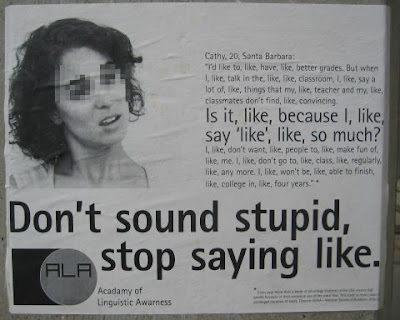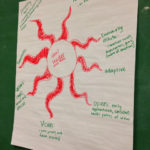Banishing verbal fillers: How, umm, to like, stop saying umm and stuff
“Umm, my name is Chris and I’m um, going to talk about a project I, uh, worked on last spring.”
“This is like, really important, because like, it impacts a lot of people, you know?”
“I don’t know this dude but I was like, ‘I’m going to just hold your hand.”*

With little exception, excessive use of verbal fillers—umms, uhhhs, likes, yeaaahhs—makes people sound stupid. Nothing can kill credibility in speaking faster than an abundance of umms and likes, and this doesn’t just go for my freshman public speaking students. It’s equally true for business people, academics presenting at conferences, politicians, employees asking for raises, partners discussing life decisions, children talking to parents, parents talking to children. Everyone!
So, what do you do if you find yourself with an “Umm” problem? In my years teaching speech, I’ve found four things especially helpful…
1. Realization is the first step to recovery. Believe it or not, people may not be aware of how often they use a particular verbal filler. For me, I tend to over-use “okaaaaay” and “so” as transitions between thoughts and “like” when I mean “said.” For example, I might say, “She was like ‘I hated that move!’” instead of “She said she hated that movie.” Of course, I didn’t realize I had these fillers until I listened to a recording of myself. As with my speech students, I highly recommend recording yourself in conversation or when giving a presentation. Yes, it’s awkward. Yes, it’s painful to listen to recordings. But you know what, it’s HELPFUL. Hearing how you sound, and even better, watching how you speak, can give you lots of information about how to improve your speech patterns.
2. Use a pregnant pause. Although “umms” definitely increase with nervousness, some fillers are really a reflection of information processing. I often find myself using a long “Ummmmmmmmm” when my students ask difficult questions that require careful wording or when I’m trying to remember something. The “umm” adds nothing and likely influences how they interpret my subsequent answers.
A solution? The pregnant pause. Once you’ve got the realization part down, start paying attention to when you use your favorite fillers. Try to catch yourself in the act and next time, instead of saying “umm” or “uhh” or “yeahhh,” try silence. Just take a pause for a second or two, and allow yourself time to think. Over time, see how your use of fillers drops. (I found that it took awhile for me to implement the pause although I did the umm “catching” pretty easily. Don’t beat yourself up though, changing behavior takes time.)
3. Find an accountability partner. The mean old school marm that I am, I typically assign my students to have someone hold them accountable for their fillers. By this I mean, I have students choose the two fillers they use most often—typically “umm” and “like.” And then I give them an index card and ask them to write the offending words on either side. The students are instructed to give the card to a trusted friend or relative (I usually time this exercise over a holiday or long weekend), and ask that person to record the number of fillers used over the course of a meal or activity. Then students are asked to reflect upon the experience.
For the students who actually take the exercise seriously, the results are profound when they realize just how much they rely upon a particular word or phrase. Again, most people don’t realize how extensively they lean on extra useless words in their speech. A twist is to have someone ring a bell, interrupt you or make you put money in a jar when you use an offending word. (If I tried the last idea with my favorite expletive, I’d probably be broke. ha!)
4. Practice, practice, practice. Okay, so this is mostly aimed at presentations but a great way to reduce verbal fillers is to PRACTICE what you are going to say. Yeah, out loud. Over and over. Being familiar with the information and practicing how you are going to say things will build your confidence and help you avoid relying on extra fillers. I promise.
Go forth and speak well my friends. And let me know if you have any other hot tips!
xoxo,
shawna
* I will never, ever, ever, EVER forget seeing that gawd awful quote in print from the Associated Press! And I will certainly never ever ever EVER forget hearing it mocked on NPR’s “Wait Wait Don’t Tell Me.” As I note in this guide to managing the media: Do NOT give interviews when half asleep. And dear journalists across the world, how about you make an effort not to make your interviewees sound stupid? I’m certain I had better quotes than that!


